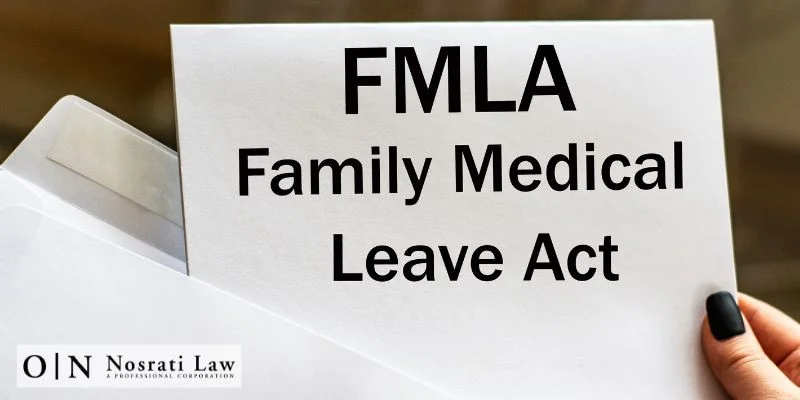
FREE CONSULT
ALL FIELDS REQUIRED*
NO RECOVERY NO FEE
The Family and Medical Leave Act (FMLA) is a federal law that grants eligible employees unpaid leave each year (up to 12 workweeks) for specific medical reasons and issues concerning family. The FMLA also mandates that applicable employers maintain health benefits for eligible workers while they take the leave. Retaliation for taking FMLA leave is unlawful.
Employees who believe they’ve suffered retaliation, such as job termination or demotion, should speak with an attorney at The Law office of Omid Nosrati. We are advocates for employees, not the employers. Our attorneys take a hands-on approach to representing our clients, giving them the attention and commitment they deserve.
If you have been terminated or demoted upon returning to work following FMLA leave, Omid Nosrati will conduct a thorough investigation regarding the timing of the incidents and look for direct correlation between FMLA leave and wrongful termination. He will keep you informed as he investigates your case and advises on the best strategy to pursue to protect your interests.

While the FMLA provides benefits and protections for many workers, it does not cover all employees. Only public agencies and private employers retaining at least 50 employees for at least 20 workweeks the previous year and are subject to the Family and Medical Leave Act. Public agencies include government bodies, school systems, and state/federal employers. The FMLA also does not apply to every employee at these workplaces. The employee must work for the employer for a minimum of 12 months and at least 1,250 hours before taking leave under the Act. Finally, the employee must work at a location or within 75 miles of a location where at least 50 employees work.
If the rules of the FMLA do apply to an employer-employee relationship, the employer legally must allow the employee to take up to 12 weeks of unpaid leave without firing the worker. An employee can only expect this to apply if he or she has a qualifying reason or condition. This includes a serious medical condition, having to care for an immediate family member, the birth of a child, the placement of an adopted or foster child, and a “qualifying exigency” surrounding active duty. The employee can also expect to have health benefits throughout the 12 weeks of unpaid leave.
In the event that an employer refuses to allow the leave or terminates/demotes an employee for taking the leave that he or she rightfully deserves, the employer is guilty of unlawful employment actions. The employee has the right to file a claim against the employer for breaking the rules of the FMLA with a government agency or the civil courts. This type of case is an “FMLA retaliation” claim, in which the employee alleges that the employer did not have the right to punish the employee for taking the leave under the FMLA.

Any adverse action could be retaliation if the action is taken because you are using the unpaid leave to which the FMLA entitles you. Always seek help from an attorney the moment you suspect workplace retaliation for a claim you filed against your employer as these claims can be extremely time sensitive. FMLA retaliation can take common forms such as:
To exercise your rights under the FMLA, you do not have to provide medical records to prove a serious medical condition. Your employer cannot ask you to cut your leave short if you have certification of your condition. Your employer also cannot request that you return to work and take on lighter duties. Your employer cannot restrict what you do during your leave, but you must obey the parameters of employment.
Retaliation in any form after taking a permitted leave under the FMLA is against the law. Protect your rights with help from our firm. Get in touch with a Los Angeles Employment Lawyer today for a free case evaluation.